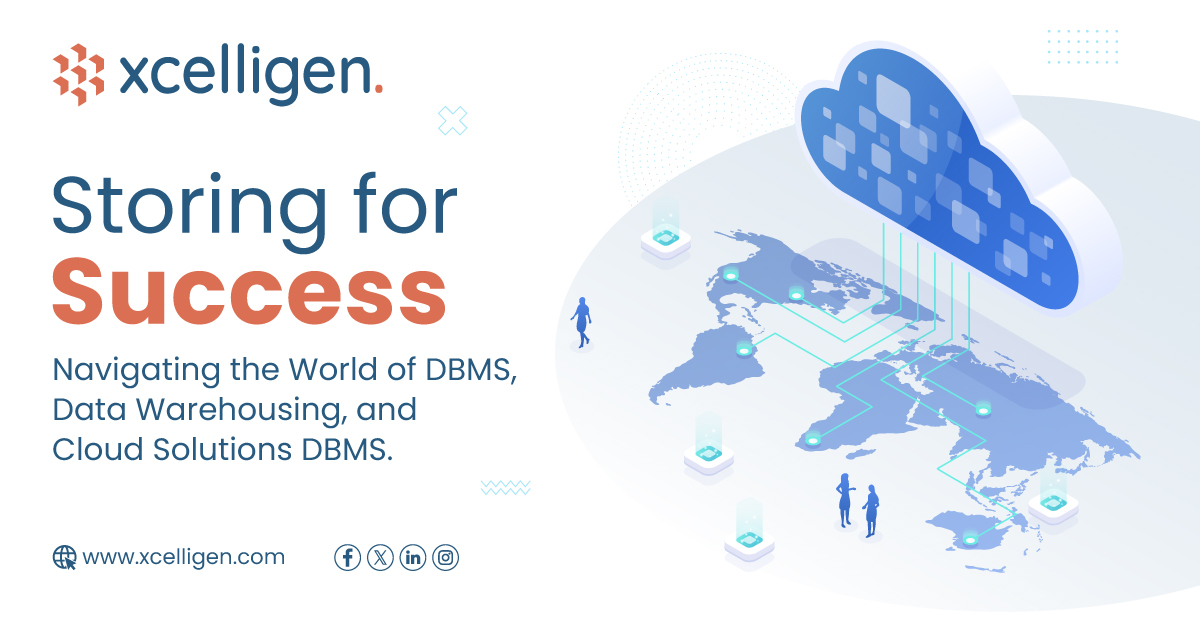The ability to effectively manage and leverage data has become a key driver of success for businesses and organizations of all sizes. Whether you’re a small startup or a large enterprise, your data storage and management strategy can significantly impact your competitiveness and growth. In this blog post, we’ll explore the essential components of data management – Database Management Systems (DBMS), Data Warehousing, and Cloud Solutions – and how they contribute to your journey towards success.
At Xcelligen, we understand the important role that data plays in modern businesses, and we are here to guide you through the intricacies of data storage solutions. Let’s get into these three pillars of data management and explore how they can lead your organization to success.
Database Management Systems (DBMS)
DBMS is the foundation of effective data management. It’s the software that allows you to create, manage, and manipulate databases. Whether you are dealing with customer information, inventory, financial records, or any other type of data, a well-chosen DBMS can streamline operations and enhance productivity.
Why DBMS Matters
DBMS forms the backbone of data storage and retrieval for most organizations. It is like the sturdy foundation of a building; without it, everything can crumble. Here’s how DBMS contributes to your success:
- Structured Data Handling: DBMS allows you to structure your data efficiently. It organizes information into tables, rows, and columns, making it easier to access and manage. This structured approach enhances data quality and integrity.
- Speed and Efficiency: A well-optimized DBMS ensures fast data retrieval and processing. This efficiency translates into quicker decision-making and improved customer service.
- Scalability: As your organization grows, your data needs will also expand. DBMS systems are designed to scale with your business, ensuring you can handle increasing volumes of data without major disruptions.
- Data Security: Data breaches can be catastrophic. DBMS systems offer robust security features to safeguard your sensitive information, reducing the risk of data breaches and compliance issues.
Data Warehousing: The Intelligence Hub
Data Warehousing takes your data management to the next level. It’s like having a centralized intelligence hub that consolidates and organizes data from multiple sources. Here’s how it contributes to your success:
- Centralized Data: Data Warehouses provide a unified view of your data, enabling complete analysis and reporting. You can gain insights into customer behavior, market trends, and operational efficiency.
- Historical Data: Storing historical data allows you to track performance over time, identify patterns, and make informed decisions based on historical trends.
- Business Intelligence: With a Data Warehouse, you can easily integrate Business Intelligence (BI) tools. These tools enable interactive data visualization, making it easier for your team to interpret and act on data.
- Data Transformation: Data Warehouses often include ETL (Extract, Transform, Load) processes that clean, transform, and enrich data before storage. This ensures data quality and consistency.
Cloud Solutions: The Scalable Advantage
Scalability and adaptability are essential in the rapid business world of today. The flexibility you need to adjust to shifting requirements is provided by cloud solutions. This is how they help you succeed:
- Cost Efficiency: Cloud solutions eliminate the need for large upfront investments in hardware and infrastructure. You pay for what you use, making it cost-effective for businesses of all sizes.
- Scalability: The cloud allows you to scale your data storage and processing capabilities on-demand. Whether you experience sudden growth or seasonal fluctuations, you can adjust your resources accordingly.
- Accessibility: Cloud solutions provide remote access to your data, enabling your team to work from anywhere. This flexibility enhances collaboration and productivity.
- Disaster Recovery: Cloud providers often have robust disaster recovery mechanisms in place, ensuring that your data remains secure and accessible even in the face of unexpected events.
Choosing the Right Solution for Your Business
The key to success in data management lies in selecting the right combination of DBMS, Data Warehousing, and Cloud Solutions for your unique needs. At Xcelligen, we specialize in tailoring data storage solutions that align with your objectives, whether you need a robust DBMS to streamline operations, a data warehouse for in-depth analytics, or a cloud solution for flexibility and scalability.
Our team of highly skilled engineers possesses the expertise to assess your requirements and recommend the most suitable technology stack. We are committed to excellence, collaboration, and client-centricity, ensuring that your data management strategy is a catalyst for your organization’s success.
Conclusion
In conclusion, mastering the intricacies of Database Management Systems (DBMS), Data Warehousing, and Cloud Solutions is the key to achieving data-driven success in today’s competitive business landscape. These pillars of data management offer the tools and capabilities needed to unlock the full potential of your data, enabling informed decision-making, enhanced efficiency, and innovation.
At Xcelligen, we are dedicated to helping you navigate this dynamic world of data storage solutions. Our commitment to excellence, collaboration, and client-centricity ensures that we can tailor a strategy that precisely aligns with your unique objectives and empowers your organization for a successful, data-driven future.
To embark on this journey toward storing for success, contact Xcelligen today, and let’s transform your data into a strategic asset that propels your business to new heights.
